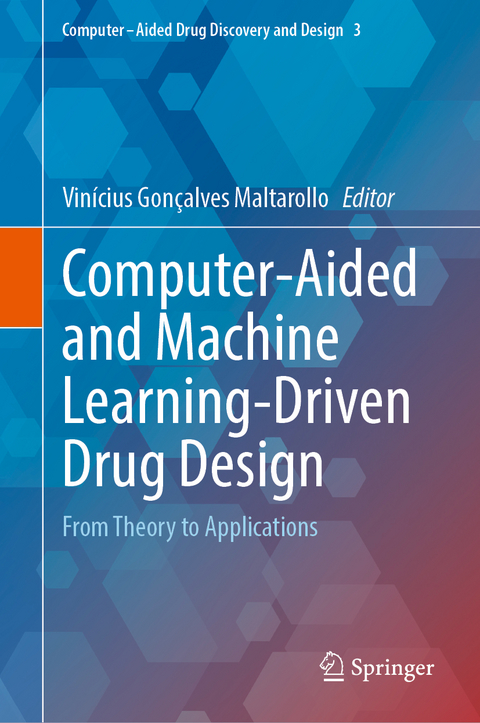
Computer-Aided and Machine Learning-Driven Drug Design
Springer International Publishing (Verlag)
978-3-031-76717-3 (ISBN)
- Noch nicht erschienen - erscheint am 10.03.2025
- Versandkostenfrei
- Auch auf Rechnung
- Artikel merken
The computer-aided drug design research field comprises several different knowledge areas, and often, researchers are only familiar or experienced with a small fraction of them. Indeed, pharmaceutical industries and large academic groups rely on a broad range of professionals, including chemists, biologists, pharmacists, and computer scientists. In this sense, it is difficult to be an expert in every single CADD approach. Furthermore, there are well-established methods that are constantly revisited, and novel approaches are introduced, such as machine-learning based scoring functions for molecular docking.
This book provides an organized update of the most commonly employed CADD techniques, as well as successful examples of actual applications to develop bioactive compounds/drug candidates. Also includes is a section of case studies that cover certain pharmacological/target classes, focusing on the applications of the previously described methods. This part will especially appeal to professionals who are not as interested in the theoretical aspects of CADD.
This is an ideal book for students, researchers, and industry professionals in the fields of pharmacy, chemistry, biology, bioinformatics, computer sciences, and medicine who are seeking a go-to reference on drug design and medicinal chemistry.
Vinícius Gonçalves Maltarollo is a Professor of Medicinal Chemistry at the Faculty of Pharmacy, Federal University of Minas Gerais in Brazil since 2016. Before that, he taught several other disciplines related to biology/pharmacy for more than 10 years to high school and undergraduate students. In terms of education, he is a Pharmacist (University of ABC, Brazil, 2006). He earned a Master of Science degree (2009) and a PhD (2013) in Chemistry, both from the Federal University of ABC in Brazil. Furthermore, he completed his postdoctoral research at the University of São Paulo (2013-2015), and was a visiting researcher at the Eberhard-Karls Universität Tübingen in Germany (2022). To date, he has published more than 70 research and review articles in peer-reviewed scientific journals with a focus on Computer-Aided Drug Design (CADD) and 3 book chapters. Finally, he is a reviewer for more than 30 scientific periodicals withmore than 120 revisions completed.
Echoes from the past, visions from the future: a journey into the Medicinal Chemistry and the Computational Drug Discovery.- Molecular Databases.- A Brief Introduction to Pharmacogenomics and Personalized Medicine in the Drug Design Context.- Machine Learning and Neural Networks Methods Applied to Drug Discovery.- Clustering of Small Molecules.- QSAR and Machine learning predictors.- Molecular docking: state-of-art scoring functions and search algorithms.- Drug Design in Motion: concepts and applications of classical Molecular Dynamics simulations.- Conformational sampling of proteins: methods for simulate protein plasticity and ensemble docking.- Free energy perturbation and free energy calculations ap-plied to drug design.- Ultra-large-scale Virtual Screening.- Experimental assays: chemical properties, biochemical and cellular assays, and in vivo evaluations.- Challenges faced in the development of computational methods for predicting pharmacokinetics behavior.- Exploring the Significance of Experimental and Computational Methods in Protein Structure Determination.- Molecular modeling strategies in drug design, development, and discovery targeting proteases.- Computational study of conformational changes in nuclear receptors upon ligand binding.- An Overview on Computational Methods Targeting the Endocannabinoid System.- Kinase Inhibitors and Computer-aided Drug Design Methods.- Prediction of Drug Metabolism with In Silico Models: A Case Study of Doping Detection.
| Erscheint lt. Verlag | 10.3.2025 |
|---|---|
| Reihe/Serie | Computer-Aided Drug Discovery and Design |
| Zusatzinfo | IX, 559 p. 114 illus., 87 illus. in color. |
| Verlagsort | Cham |
| Sprache | englisch |
| Maße | 155 x 235 mm |
| Themenwelt | Naturwissenschaften ► Biologie ► Genetik / Molekularbiologie |
| Technik ► Umwelttechnik / Biotechnologie | |
| Schlagworte | Artificial Intelligence • computer-aided drug design • drug design • machine learning • Modern Medicinal Chemistry • Virtual Screening |
| ISBN-10 | 3-031-76717-9 / 3031767179 |
| ISBN-13 | 978-3-031-76717-3 / 9783031767173 |
| Zustand | Neuware |
| Informationen gemäß Produktsicherheitsverordnung (GPSR) | |
| Haben Sie eine Frage zum Produkt? |
aus dem Bereich


